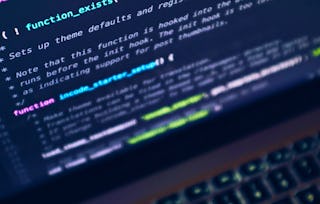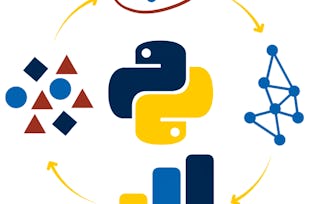This course is designed for the Python programmer who wants to develop the foundations of Calculus to help solve challenging problems as well as the student of mathematics looking to learn the theory and numerical techniques of applied calculus implemented in Python. By the end of this course, you will have learned how to apply essential calculus concepts to develop robust Python applications that solve a variety of real-world challenges. Video lectures, readings, worked examples, assessments, and Python code are all provided in the course. These are used to illustrate techniques to solve equations, work with functions, and compute and apply derivatives and integrals. If you are interested in starting to develop concepts in fields such as applied math, data science, cybersecurity, or artificial intelligence, or just need a refresher of calculus or coding in Python, then this course is right for you.

Applied Calculus with Python

Applied Calculus with Python

Instructor: Joseph W. Cutrone, PhD
Top Instructor
6,812 already enrolled
Included with
45 reviews
Recommended experience
Skills you'll gain
Details to know

Add to your LinkedIn profile
9 assignments
See how employees at top companies are mastering in-demand skills

There are 5 modules in this course
Programming now has relevance well beyond just Computer Science. In this module and throughout this course, you will learn not only about programming using Python, but also how to use those skills to solve real, complex problems in future classes, at work, or elsewhere. To ensure this, copious amounts of examples are included, with explanations, throughout the course. You are strongly encouraged not only trace through them, but also experiment with (run, alter, break) them on your own. The assignments are linked to the respective module. Putting time in here will give you the opportunity to solve actual scientific problems and challenge you in a way that that’ll not only help you make use of the skills we’ll discuss in lecture, but also to leave you with that oh-so-satisfying feeling of having conquered the challenge when you’re done!
What's included
2 videos4 readings1 assignment
Functions arise whenever one quantity depends on another. Mathematically speaking, a function is a rule that assigns to each element x in a set D (called the domain) exactly one element, called f(x), in a set called the range. Because we continually make theories about dependencies between quantities in nature and society, functions are important tools in the construction of mathematical models. In this module, we will learn the theory of functions, see many examples and their graphs, as well as apply these functions. We will learn how to implement these functions in Python as well.
What's included
9 videos7 readings2 assignments1 ungraded lab
Calculus is the science of measuring change. Early in its history, its tools were developed to solve problems involving the position, velocity, and acceleration of moving objects. Prior to the development of calculus, there was no way to express this change in a variable. In this section, we introduce the notion of limits to develop the derivative of a function. The derivative, commonly denoted as f'(x), will measure the instantaneous rate of change of a function at a certain point x = a. This number f'(a), when defined, will be graphically represented as the slope of the tangent line to a curve. We will see in this module how to find limits and derivatives both analytically and using Python.
What's included
11 videos7 readings2 assignments1 ungraded lab
The derivative is defined as a limit of the difference quotient. Computing this limit symbolically is very challenging for complicated functions. In this section, we develop rules that find the derivative without having to fall back on the limit definition each time. These rules are purely algebraic in nature and help us gain intuition into the behavior of a derivative function. More importantly, these rules help to demystify the Derivative() function and show the steps to produce the functions output. Understanding the process allows for mastery, adaptation, and more complicated applications of these concepts.
What's included
9 videos6 readings2 assignments1 ungraded lab
One major topic in calculus is what is called "integral calculus," which involves finding areas or volumes of regions by adding up small slices. We start to think about areas or volumes as an accumulation of the smaller slices that make them and from that we can apply the theory of integral calculus to measure net change and total accumulations. Then, by the Fundamental Theorem of Calculus, this is then related back to where we started: derivatives. This module introduces some of the most beautiful and useful applications of calculus. Algebraic techniques will be shown alongside of numerical computations using Python.
What's included
8 videos6 readings2 assignments1 ungraded lab
Instructor

Offered by
Explore more from Data Analysis
 Status: Free Trial
Status: Free Trial Status: Free Trial
Status: Free TrialUniversity of Michigan
 Status: Free Trial
Status: Free Trial Status: Free Trial
Status: Free TrialUniversity of Michigan
Why people choose Coursera for their career

Felipe M.

Jennifer J.

Larry W.

Chaitanya A.
Learner reviews
- 5 stars
93.33%
- 4 stars
4.44%
- 3 stars
0%
- 2 stars
0%
- 1 star
2.22%
Showing 3 of 45
Reviewed on Jan 21, 2025
Cuts through the tediousness of math to get through the concepts of calculus. Good for continuing learning.
Reviewed on Jun 19, 2022
The mix of Python & Calculus is a special feature. I learned a lot.
Reviewed on Sep 13, 2022
A relaxed reintroduction to calculus with an approachable way to use SymPy to solve calculus problems.

Open new doors with Coursera Plus
Unlimited access to 10,000+ world-class courses, hands-on projects, and job-ready certificate programs - all included in your subscription
Advance your career with an online degree
Earn a degree from world-class universities - 100% online
Join over 3,400 global companies that choose Coursera for Business
Upskill your employees to excel in the digital economy
Frequently asked questions
To access the course materials, assignments and to earn a Certificate, you will need to purchase the Certificate experience when you enroll in a course. You can try a Free Trial instead, or apply for Financial Aid. The course may offer 'Full Course, No Certificate' instead. This option lets you see all course materials, submit required assessments, and get a final grade. This also means that you will not be able to purchase a Certificate experience.
When you purchase a Certificate you get access to all course materials, including graded assignments. Upon completing the course, your electronic Certificate will be added to your Accomplishments page - from there, you can print your Certificate or add it to your LinkedIn profile.
Yes. In select learning programs, you can apply for financial aid or a scholarship if you can’t afford the enrollment fee. If fin aid or scholarship is available for your learning program selection, you’ll find a link to apply on the description page.
More questions
Financial aid available,

